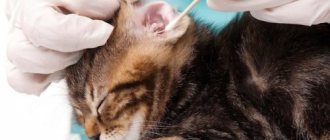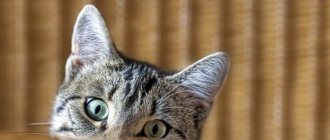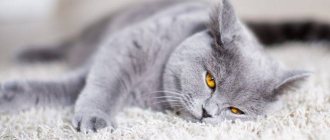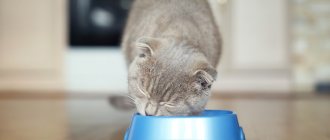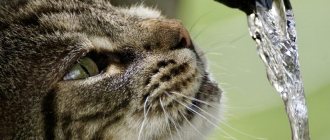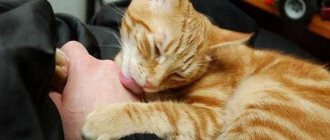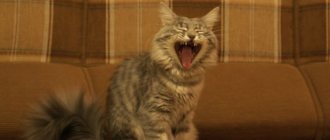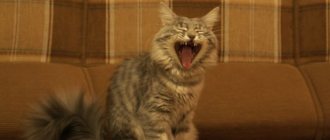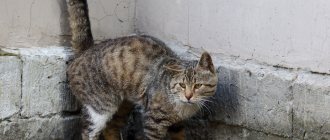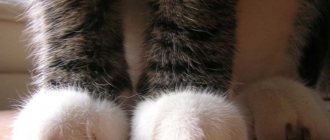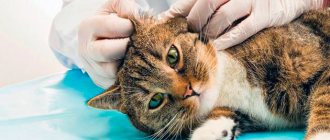7051Administration
1
Why a cat eats soil worries the owner if he suddenly sees such strange behavior of his pet. Many people are often very scared, believing that such a phenomenon may indicate that the cat is dying and will soon be separated from the pet. In reality, this is not the case, and eating soil does not indicate the cat's approaching death. A cat can eat soil both in the garden, during a walk, and by getting it from a flower pot. The latter is quite dangerous, since there is usually a lot of fertilizer in the soil for indoor plants, which can cause poisoning of the animal.
A kitten may suffer more severely from fertilizers. Adult cats quietly receive mild poisonings for a long time, which appear at the moment when the internal organs begin to fail seriously. The veterinarian is not always able to help in such a situation. The first thing that occurs when eating store soil is gastritis.
© shutterstock
Reasons: why does the cat chew the soil?
Diseases
Veterinarians identify factors that cause a cat to eat sand:
- Brain tumor. Compression of parts of the central nervous system contributes to the deterioration of the animal’s understanding of what it is consuming. In addition to soil, a pet can eat polyethylene, foam, and fabrics. Not only taste preferences change, but also behavior in general.
- Anemia. An unbalanced or monotonous diet leads to a lack of iron and a decrease in hemoglobin, which affects appetite.
- Leukemia. The disease is provoked by an oncovirus and is characterized by pathological growth of hematopoietic tissue. All organs and systems are affected, which affects the change in taste sensations.
- Diabetes. Disruption of metabolic processes prevents the absorption of nutrients. Because of this, the cat eats the soil from the flower pot.
- Worm infestation. Parasites feed on beneficial substances that enter the body with food, which is why the animal suffers from a lack of microelements. This disrupts the functioning of organs, which causes them to eat the earth.
Return to contents
Lack of vitamins
Psychological disorders
Long-term stress contributes to the development of obsessive states, when the pet not only eats soil. Signs of neurosis appear:
- excessive licking;
- biting wool until bald spots form;
- rhythmically repeating movements;
- clicking teeth;
- biting the paws or tail until wounds form.
Return to contents
Curiosity
Colon cleansing
Symptoms of vitamin deficiency
Insufficient nutritional components as a result of an unbalanced diet can lead to eating and licking objects that seem unsuitable at first glance. This could be cardboard, tray filler, or your own biological waste.
Why does a cat eat soil from a flower pot? If the planting substrate was purchased in a specialized store, you can safely assume a lack of microelements. After all, fertilizers contain many minerals, such as sodium, potassium, phosphorus, calcium.
Vitamin deficiency can be determined by dull fur or uneven appetite - some animals become gluttons, while others begin to starve. The veterinarian will use tests to determine whether there is a deficiency of minerals and vitamins and prescribe the required treatment.
Premium food contains all the necessary vitamin and mineral complex, selected depending on the age and preferences of the pet. Therefore, veterinarians recommend using special food for the cat family. It is important to choose a quality product - this is guaranteed to eliminate problems with nutritional deficiencies.
Should a cat be allowed to eat soil?
The danger that eating soil poses to an animal lies primarily in the presence of parasite larvae and eggs in it. As a result of this, when a cat eats soil, it swallows them, which causes infection.
A cat eating soil is not normal, but at the same time it is not a signal of the development of a dangerous disease. The main thing is to identify the cause of the anomaly as soon as possible and eliminate it.
I recommend: Parasites in cats
Mental disorders
Pica is a disorder similar in severity to anorexia and bulimia. Expressed in the desire to eat inedible objects. Appears as a result of mental disorder, nervous shock and can lead to death.
Research by scientists on animal behavior has revealed that pets, just like people, are susceptible to depression and fear. Pica in science is divided into two types:
- A common disorder is eating paper, stones, and earth.
- Coprophagia is the eating of feces.
Cats are susceptible to both forms of the disease. In order to determine why a cat eats soil from a psychological point of view, it is necessary to analyze all the facts from the pet’s life.
The problem could begin in childhood, especially for animals picked up from the street at an early age. Starvation leads to death after 3-4 days. Even if the kitten was rescued during this period and provided with the required care, the consequences of the injury may appear several years later. The animal will more often suffer from gluttony throughout its life, and this often leads to the second type of eating disorder – coprophagia.
It is more difficult for a domestic cat to experience hunger, which, due to circumstances, finds itself on the street and is forced to remain without food. Having found a secluded refuge, the pet hides and the feeling of fear blocks the need for food. The pet is paralyzed by fear and prevents it from moving. If the owners manage to find the animal and save it, then recent impressions haunt the shocked person for a long time. Here is another psychological reason why a cat eats soil from indoor pots.
We suggest you read: What to do to prevent your cat from chewing wires
Lack of mineral salts
- with poor nutrition of animals;
- during the period of offspring growth;
- in pregnant and lactating females;
- after injuries and during the healing period of fractures;
- for chronic colitis, dysbacteriosis and other diseases of the gastrointestinal tract that affect the absorption of vitamins and minerals from food;
- with hormonal dysfunctions leading to softening of bones and poor absorption of mineral salts.
It is noteworthy that feeding domestic cats mainly with meat pulp and fish causes an excess of phosphorus with a clear lack of calcium.
Trying to replenish their supply of minerals, animals may not only eat the soil, but also lick and chew:
- chalk;
- clay;
- whitewashed walls;
- plaster;
- cement screeds;
- drywall.
Exploring the environment
During the period of active growth, kittens want to experience as much as possible everything that is around them. If there are pots of flowers available, the baby will not disdain and decide to try something new. However, such behavior is commonplace, so it is undesirable to allow animals to try inedible things too often.
Deviations are observed in the first 2 months of a baby’s life and can last up to 4 years. The kitten must be distracted with games, toys or treats. Otherwise, the pet will begin to constantly pester the plants, perceiving them as a game. And this is very dangerous for health, and a broken pot can cause serious injury.
Hairballs in the stomach
As a result, so-called “trichobezoars” are formed, sometimes filling the entire stomach cavity and reaching the volume of a tennis ball. To remove them and save the pet's life, urgent surgery is required.
Some hairballs come out naturally or through periodic spontaneous vomiting.
But if this does not happen, the animal begins to instinctively eat objects that stimulate gastric peristalsis, for example:
- grass with long, hard leaves;
- coarse thread;
- New Year's decoration "rain";
- cassette film;
- potted plants and soil.
Sometimes this works as an emetic, but sometimes it even worsens the condition, blocking the intestinal lumen even more.
Expert advice. To prevent the appearance and growth of trichobezoars, you must follow the rules and recommendations:
Description and background
In scientific circles, this phenomenon is called pica. It refers to the emergence of a strong desire to try an inedible object or substance. In medical practice, it is classified as a mental disorder. In the veterinary field, it is considered a consequence of an incorrect diet or an emerging disease. What would be so forbidden to eat?
Before stuffing your ward with vitamins, believing that the problem is a deficiency, it is recommended to analyze the situation. A completely healthy cat will not eat soil or plants. This means that something has gone wrong in the life of “Murka”. Problems arise both from diseases and from mental trauma.
Parasites
In nature, cats eat sand to get rid of parasites. A domestic cat can consume litter from a litter tray or soil from flower pots.
Recommend: How cigarettes affect cats
Severe infestation causes the cat to feel bloated and itchy. If your pet is already trembling after such a “delicacy,” then remember the last time you carried out worm prevention.
When an animal has parasites, it will eat soil greedily, vomiting and the presence of soil in the stool may also occur.
By the way, recent prevention against worms does not provide an exact guarantee. Classic remedies for parasites have a certain spectrum of action and are not designed for “exotic” representatives.
To confirm the diagnosis, it is necessary to submit the animal's feces for laboratory analysis. Based on the results, the veterinarian will prescribe treatment.
Attention deficit
Cats are provocateurs. There is no other animal in nature that is capable of taking revenge or doing something to spite its owner. Therefore, if you pay little attention to a cat, it is able to find something to do to its liking. No person will stand and watch while an animal digs or eats soil from a flower pot. The cat quickly remembers the owner’s reaction and subsequently attracts attention to itself in this way.
Boredom and monotony strengthen the animal's exploratory instincts. Lay out dry food, unusual sleeping places and joint games will diversify the pet's life and quench curiosity.
Why does a cat eat the ground?
Why are kittens interested in soil in a pot?
A cat can eat soil in 4 cases.
The cat lacks vitamins
Most often, soil from stores is used for flowers. Such soil is enriched with many microelements. If you bought just such land, and then found a pet eating soil from a flower pot, then most likely your animal has vitamin deficiency .
In this case, it is necessary to show the animal to a veterinarian. He will conduct an examination, take tests and prescribe the correct treatment. Most importantly, do not try to give your cat any vitamins yourself. An overdose of them is dangerous for the life of your pet.
Never allow your cat to eat street soil. It contains many dangerous chemicals that will cause severe poisoning in your pet.
Don't let your cat eat street soil!
The cat is infected with parasites
One of the reasons for eating soil from a pot is worms.
Outdoor cats can eat sand, it helps get rid of parasites.
At home, the pet greedily eats soil from a pot or litter from the toilet. If there are worms, the cat will vomit and have dirt in its stool. These symptoms should force you to urgently consult a specialist.
Cat cleans its stomach
Have you noticed how a cat greedily eats grass on the street? Thus, it expels hairballs from the stomach. In apartment conditions, and especially in winter, there is no grass.
I recommend: Diarrhea in cats
By eating grass, the cat expels hairballs from its stomach.
Therefore, the animal may begin to eat soil to expel fur from the stomach.
In this case, you can buy specially grown grass for pets at a pet store, or buy a drug that expels six from the intestines.
The cat has a mental disorder
In practice, this rarely happens, but it still happens.
Psychological disorders in a cat can cause shock, fear, phobias or severe stress. This condition can lead to the pet starting to eat inedible objects.
This could be soil, paper, or even feces.
If a cat has a mental disorder, it may start eating paper.
How to wean your pet from a harmful activity?
In principle, there is nothing wrong with cleansing the body with soil from indoor pots for a cat. It is important that there are no harmful elements in the soil. And since urban soil contains toxins, gasoline impurities and other chemical compounds, the soil on the street and in the garden is not safe for cats. Finding environmentally friendly soil in modern life is extremely difficult.
Instead of being beneficial, the consequences of consuming such soil can be very disastrous. Therefore, special pastes that dissolve wool or green grass will replace the earthen sorbent.
Proper cat care, good nutrition, games, walks and regular preventive examinations by a veterinarian will help keep your pet healthy.
Stomach cleansing
- Many people know that felines need to clean their stomachs of fur from time to time. Hairs get into the stomach when licked and need to be disposed of in a timely manner. Cats often use ordinary grass for such purposes.
- Accordingly, at home the cat can only use the soil in flower pots as a brush. As mentioned earlier, it is best to grow your own grass for your pet. In this way he will satisfy all his needs.
- Consult with a consultant at a pet store which seeds are best to purchase and germinate. As an alternative, it is recommended to regularly give your pet a special composition in the form of a paste. It helps remove swallowed fur from the gastrointestinal tract.
why and why cats eat grass
Lack of essential enzymes
- Take a closer look at the animal’s behavior; if this feature worsens with the onset of spring, then we can say that the cat most likely lacks useful compounds. Simply put, the animal suffers from vitamin deficiency.
- This will especially indicate if the cat is happy to eat soil purchased from the store. This composition contains many valuable compounds. The land is enriched with fertilizers. As a result, the cat tries to replenish the vitamins it needs.
- Most often, animals suffer from a deficiency of phosphorus, calcium, sodium and potassium. In this case, it is enough to correctly prepare the diet so that the cat stops feasting on the earth. In addition, some cat owners claim that the animal may experience a deficiency of certain elements due to eating a large amount of meat.
- The problem is that such a product leaches calcium from the body in large quantities. As a result, the animal may suffer from the development of rickets or osteoporosis. In any case, you shouldn't wait for anything. Be sure to seek help from a specialist.
- It is strongly recommended to refrain from starting to give your pet various microelements and synthetic vitamins on your own. Only a veterinarian should prescribe a special diet and prescribe certain nutritional supplements.
- To ensure that your cat fully receives all the vitamins it needs, you can germinate oats, peas, wheat, rapeseed and barley yourself. As an alternative, you can purchase special grass for cats from a pet store.
- The cause of an animal’s unusual addiction may be the development of anemia. Kittens can especially suffer from this pathology. An unpleasant disease develops due to active growth. The disease can be recognized by the pale tint of the mucous membranes. General lethargy and bradycardia are also evident.
- To confirm the diagnosis, you need to take the animal to the clinic so that the doctor does a blood test. This way you can find out about your iron levels. If anemia occurs in the acute stage, it will need to be treated with serious injectable drugs.
why does a cat bury food
Understanding the world around us
Kittens and young cats may taste the soil or chew other non-edible objects as part of normal exploratory behavior. In this case, it is advisable to switch the kitten’s attention from the pot with the plant to other, more suitable objects for chewing. Offer your kitten new toys, including ones that can be chewed on. It is important not to maintain the habit of tasting houseplants and digging in the soil, since some indoor plants can be very toxic to cats (for example, representatives of lilies), and eating soil can cause vomiting and diarrhea, and the appearance of the apartment after “proceedings” with a flower usually leaves much to be desired. Some cats and kittens sometimes begin to use flower pots as an additional tray, which does not at all fit into the ideas of most cat owners about a domestic idyll. Therefore, if a cat or kitten stubbornly and persistently pays attention to a house plant, and distraction methods do not help, it is recommended to remove this object of attention completely so as not to reinforce unwanted forms of behavior.
Worm infestation
Infection of cats with parasitic worms is a fairly common problem.
At risk are stray animals and cats on their own, and small kittens are most susceptible to infection.
The worms living inside feed on the host’s blood and semi-digested food, causing the following symptoms:
- loss of appetite and weight loss;
- lethargy and weak muscle tone;
- disturbances in the digestive tract;
- increase in abdominal volume due to the accumulation of parasites;
- the presence of mucus and blood in the stool;
- problems with the coat;
- lacrimation;
- anemia and pallor of mucous membranes.
Self-cleaning. Feeling discomfort and constant pain in the stomach, the cat strives to cleanse the body of accumulated nastiness. For this purpose, baleen-striped eat sand, soil and grass with hard leaves. All this stimulates the gag reflex and sometimes leads to the removal of live parasites through the mouth. However, in this case, worms are equipped with all kinds of hooks and hooks in the head part, which allow them to be firmly held in the intestinal mucosa, despite strong peristaltic waves.
Diagnosis and treatment. Recognition of the species of the parasite is based on laboratory test data, after which the veterinarian prescribes suitable anthelmintic drugs that paralyze the worms and remove them naturally.
Stressful conditions
The animal's brain controls all actions and functions of the body, including the absorption of food. But if the psyche is not in order, then eating behavior may also suffer, namely:
Psychological aspects. Sometimes cats suddenly begin to be attracted to the earth, and then house cats eat it in the front garden or straight from a flower pot. You should not think that in this way the pet is trying to replace food or is expressing some kind of protest regarding the current circumstances. Perhaps a long-standing natural association is at work here: “If you eat, it’s good, if you eat, then it’s bad.”
Diligently chewing lumps of earth, the excited cat tries to calm down, not understanding too much the taste of this “dish.” The psyche of apartment dwellers who live in comparative isolation and do not regularly experience various stimuli as “hardening” factors is especially delicate.
